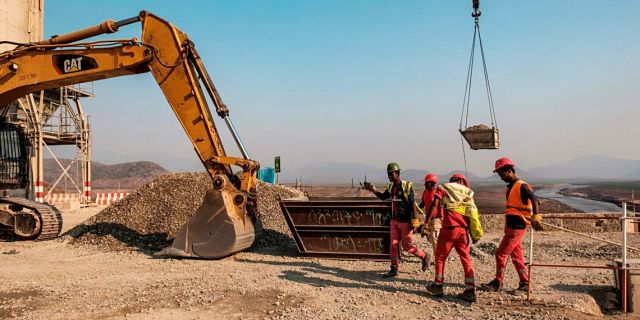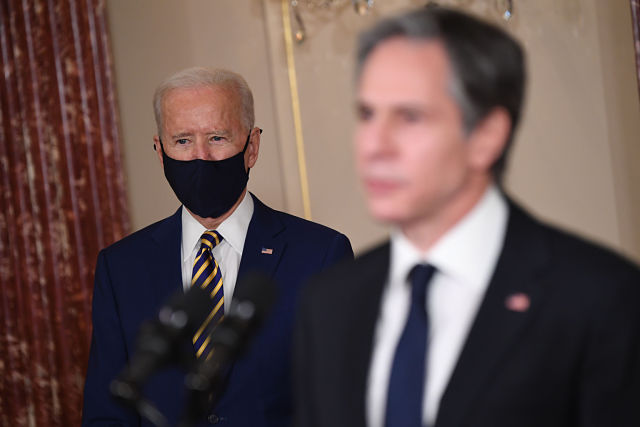 Ethiopians were furious after former President Donald Trump last year directed the suspension of aid to their country in a rare example of his direct involvement in an African issue. Ethiopia had left a U.S.-led attempt to mediate the dispute with Egypt, alleging bias. Trump also caused an uproar by saying downstream Egypt would "blow up" the dam project that Cairo considers an existential threat. - AP (Getty Images)
Ethiopians were furious after former President Donald Trump last year directed the suspension of aid to their country in a rare example of his direct involvement in an African issue. Ethiopia had left a U.S.-led attempt to mediate the dispute with Egypt, alleging bias. Trump also caused an uproar by saying downstream Egypt would "blow up" the dam project that Cairo considers an existential threat. - AP (Getty Images)
Reuters
US to Unlink Paused Ethiopian Aid from Dam Policy
WASHINGTON – The U.S. State Department on Friday said Washington will unlink its pause on some aid to Ethiopia from its policy on the giant Blue Nile hydropower dam that sparked a long-running dispute between Egypt, Ethiopia and Sudan.
U.S. State Department spokesman Ned Price told reporters that President Joe Biden’s administration will review U.S. policy on the Grand Ethiopian Renaissance Dam (GERD) and will assess the role the administration can play in facilitating a solution between the countries.
Filling started in July
A bitter dispute between Egypt, Ethiopia and Sudan over the filling and operation of the dam remains unresolved even after the reservoir behind the dam began filling in July.
“We continue to support collaborative and constructive efforts by Ethiopia, Egypt and Sudan to reach an agreement on the GERD,” Price said.
The temporary pause on certain U.S. foreign assistance to Ethiopia affects $272 million in development and security assistance to Ethiopia, Price said, adding that the resumption of assistance will be assessed on a number of factors and that the decision has been shared with Addis Ababa.
Among the factors assessed will be “whether each paused program remains appropriate and timely in light of developments in Ethiopia that occurred subsequent to the pause being put in place,” a State Department spokesperson said.
Trouble in Tigray region
The United States has expressed concern over the humanitarian crisis in the Tigray region of Ethiopia, where the central government has claimed victory over a rebellious regional government in a conflict that began in November.
Ethiopia began filling the reservoir behind the dam after the summer rains last year despite demands from Egypt and Sudan that it should first reach a binding agreement on the dam’s operation.
Egypt views the dam as a major threat to its fresh water supplies, more than 90% of which come from the Nile. The Blue Nile flows north into Sudan then Egypt and is the Nile’s main tributary.
Aid cut to Ethiopia
Ethiopia says the dam is crucial to its economic development.
Then-U.S. President Donald Trump said Ethiopia had broken a U.S.-brokered agreement to resolve the dispute, forcing him to cut funds. The United States cut $100 million in aid to Ethiopia in September.
Ethiopia in October summoned the U.S. ambassador over what it called an “incitement of war” between Ethiopia and Egypt from Trump over their dispute.
—
Related:
US: Aid pause to Ethiopia no longer linked to dam dispute (AP)
Biden Mulls Special Envoy for Horn of Africa (FP)

The post, if created, would bring more diplomatic firepower to the brewing crisis in Ethiopia as members of Biden’s cabinet and other senior State Department nominees await confirmation. (Photo: U.S. Secretary of State Antony Blinken speaks to staff during the first visit of President Joe Biden to the State Department in Washington on Feb. 4./ GETTY IMAGES)
Foreign Policy Magazine
This article is part of Foreign Policy’s ongoing coverage of U.S. President Joe Biden’s first 100 days in office, detailing key administration policies as they get drafted—and the people who will put them into practice.
The Biden administration is weighing plans to establish a new special envoy for the Horn of Africa to address political instability and conflict in the East African region, including a brewing civil war and humanitarian crisis in northern Ethiopia, current and former officials familiar with the matter told Foreign Policy.
The new special envoy post could fill a diplomatic leadership gap in the administration’s foreign-policy ranks as it works to install other senior officials in the State Department, a process that could take weeks or even months to complete, as they require presidential nomination and Senate confirmation. Special envoy posts do not require Senate confirmation.
A new Horn of Africa envoy would have their work cut out for them: Sudan is undergoing a delicate political transition after three decades under a dictatorship, South Sudan is wracked by chronic instability and corruption, and the fragile government of Somalia is grappling with ongoing threats from the al-Shabab terrorist group and political gridlock that has delayed national elections. An ongoing dispute between Ethiopia, Egypt, and Sudan over a major dam project adds another layer of complexity to the tensions in the region.
The most pressing crisis in the eyes of many U.S. policymakers, however, is in Ethiopia. In November 2020, Prime Minister Abiy Ahmed launched a military campaign against the ruling party in the country’s northern Tigray region, after accusing it of attacking a government military base. Conflict has ravaged the region since then, marked by thousands of deaths, millions in need of humanitarian assistance, and widespread reports of interethnic violence. U.S. officials fear that the conflict could turn into a full-blown regional crisis, with turmoil spilling over into neighboring Eritrea and Sudan.
While officials cautioned no final decision has yet been made, one top contender for the potential job is Donald Booth, a seasoned diplomatic troubleshooter in the region who currently serves as U.S. special envoy for Sudan and has previously served as U.S. ambassador to Liberia, Zambia, and Ethiopia.
Some experts welcomed more attention to the Horn of Africa but cautioned against the new administration relying too heavily on special envoy posts. “I don’t want us to get back into the practice of throwing special envoys at every problem set. It often saps the State Department’s resources and authorities in ways that aren’t productive,” said Judd Devermont, director of the Africa Program at the Center for Strategic and International Studies, a think tank, and a former senior U.S. intelligence analyst. “But in this case, it is urgent, and there aren’t enough senior people in the region.”
With less than a month in office, President Joe Biden doesn’t yet have his full cabinet in place, let alone many senior posts across the State Department that require Senate confirmation. Biden has yet to name a nominee for the assistant secretary of state for African affairs, and the U.S. ambassador posts in Eritrea and Sudan are unfilled, held in an acting capacity by lower-ranking diplomats. The next U.S. ambassador to Ethiopia, Geeta Pasi, is expected to arrive at her post shortly.
A State Department spokesperson did not confirm the administration was set on creating the new special envoy post when asked for comment. “Africa is a priority for the Biden-Harris administration, and we are committed to re-invigorating our relationships throughout Africa from a position of mutual respect and partnership. This includes deepening our engagement on the challenging issues present in the Horn of Africa,” the spokesperson said. “Senior-level engagement on a consistent basis will be a signal of our commitment. The Administration is actively considering a range of options to ensure that our staffing, including any use of Special Envoys, supports implementation of our strategy.”
One big question would be whether the new special envoy post would report directly to the president or secretary of state, or to the assistant secretary of state for African affairs. The former would be viewed as more empowered to negotiate on behalf of Washington, with a direct line to the president or his cabinet.
Some administration insiders have also floated the idea of tapping a former senior U.S. lawmaker for the job, arguing someone with political clout could engage directly with senior African leaders, including Ethiopia’s Abiy. (Biden has eyed former Republican Arizona Sen. Jeff Flake for a senior diplomatic post, such as an ambassadorship in South Africa or Europe, according to Axios.)
—
Join the conversation on Twitter and Facebook.

























